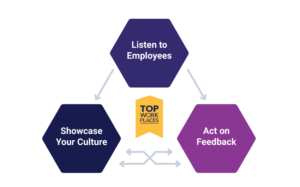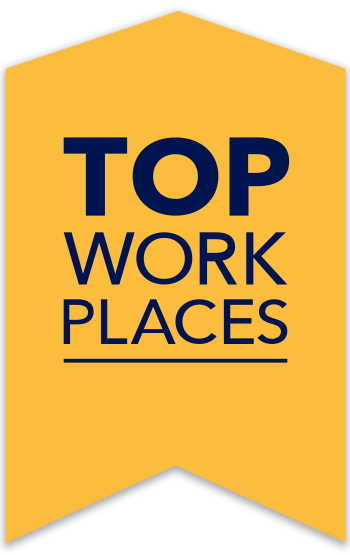Why do some companies attract top-notch talent almost effortlessly while others struggle? It has a lot to do with effectively communicating and showcasing a solid, authentic employer brand. Once considered a trendy buzzword, the concept of employer brand has become the secret ingredient that drives a successful recruitment strategy.
Research suggests organizations are missing the mark. A recent Top Workplaces study shows that employers and job seekers alike are struggling with the recruiting and hiring process. One thing stands out:
While 80% of employers believe they effectively convey their company culture to job seekers, only 30% of candidates share the same perception.
Many well-intentioned employer brand strategies face this challenge, but the good news is that there is a solution. Let’s explore the issue by first exploring the most prevalent employer branding mistakes. Afterward, we’ll provide you with best practices for crafting an irresistible employer brand.
What employer brand is and why it matters
Employer branding isn’t about self-promotion to attract top talent. At the core, it’s about spotlighting and championing your organization’s workplace culture and what makes it unique. It offers prospective candidates an authentic glimpse into the day-to-day experience of being part of your team. Employer branding is essential to your recruitment and retention and brand reputation strategies because it provides an honest portrayal that helps candidates decide if your organization is a good fit.
Common employer branding mistakes to avoid
Understanding the potential pitfalls is one of the first steps in crafting a successful employer brand. Here are the most common mistakes:
1. Lack of strategy
Without a strategy, you are left without a clear direction for communicating your organization’s unique workplace identity. This leads to an inconsistent message, which makes it challenging to attract top talent that aligns with your culture and purpose.
2. Inauthenticity
An inauthentic employer brand poses a significant problem because it creates a discrepancy between the company’s portrayed brand reputation and the actual workplace experience. It also erodes credibility, leading to increased levels of employer turnover.
3. Lack of consistency
Inconsistency leaves job candidates unsure about what your company truly stands for and dilutes the impact of your organization’s purpose and values. When your employer brand varies across channels or over time, it undermines establishing a strong and recognizable corporate identity.
4. Excluding employee feedback
When you don’t consider or include employee feedback as part of your strategy, you fail to know what drives your workplace culture. It also deprives your employer brand of authenticity.
5. Neglecting online brand reputation
Job candidates look to online reviews and social media to form an opinion about your organization. Allowing negative perceptions to fester can significantly impact the employer brand you carefully crafted.
6. Bland job descriptions
Generic and uninspiring job descriptions fail to capture the attention of potential candidates and convey the organization’s unique culture and employer brand.
7. Limited employee involvement
Employees are firsthand witnesses to your organization’s workplace culture. Neglecting them as talent ambassadors means missing out on a genuine and relatable narrative that can positively influence external perceptions.
8. Underestimating employee advocacy
Underestimating employee advocacy disregards the important role satisfied and engaged employees can play in shaping your company’s reputation. Failing to harness their influence means missing an opportunity to amplify your company’s positive image.
9. Limiting the talent pool
Recent survey data from the Top Workplaces Research Lab reveals that a limited talent pool is the number one obstacle to hiring and recruiting. Unintentionally limiting your talent pool is an employer branding mistake because it narrows the opportunities to attract and engage a diverse range of qualified candidates.
10. Lack of employer recognition awards
A lack of employer recognition awards is an employer branding mistake because these accolades are powerful endorsements of a company’s positive workplace practices. In a competitive landscape, where job seekers rely on external validations, the absence of recognition awards may signal a missed chance to showcase the company as an employer of choice.
Related: Why Employer Recognition Awards Matter
11. Shortsightedness
Recruitment and retention are a long game. Strong employer branding requires dynamic strategizing over long periods, not random, one-time campaigns.
12. Not delivering on promises
Failing to deliver on promises hurts your employer brand, eroding trust and credibility. When a company fails to fulfill its commitments to employees regarding work culture, benefits, or growth opportunities, it disjoints the promised employer brand and the actual employee experience.
Related: How to Improve Employee Retention
13. Lack of investment
A lack of investment in employer branding diminishes an organization’s ability to create a compelling and competitive image in the job market. Without it, organizations may struggle to differentiate themselves from competitors, attract top talent, and retain their existing workforce.
14. Not measuring success
Assessing whether the implemented strategies achieve the desired outcomes becomes challenging without measurable metrics. Failing to gauge the impact of employer branding efforts can lead to missed opportunities for improvement and hinder the ability to attract, engage, and retain top talent.
Three steps to build an authentic employer brand

Listen to employees
Start by conducting an employee engagement survey to measure what drives your organization’s workplace culture. Using a third-party survey that is confidential and research-backed will ensure a healthy response rate and build employee trust. By actively listening to your employees, you will show them you value their input.
Act on feedback
Analyze employee feedback to identify key themes and then act on that data. By responding to employee feedback, you demonstrate a commitment to continuous improvement and foster a workplace culture that values and prioritizes the employee experience.
Showcase your culture
Promote culture strengths found in the employee survey feedback and showcase third-party employer recognition awards. Integrating genuine employee feedback improves your employer brand credibility, providing job candidates and stakeholders with a transparent and compelling view of what makes your workplace culture unique.
Related: Build and Drive Employer Brand
Build your employer brand with Top Workplaces
Third-party employer recognition awards such as Top Workplaces are important in employer branding. The accolades provide tangible evidence of excellence, laying the foundation for a trusted employer brand. Top Workplaces awards enhance your organization’s visibility and attract valuable media exposure. Showcasing these awards goes beyond aesthetics; they position your company as an employer of choice.
Make a credible and authentic employer brand part of your recruitment strategy. Participate in Top Workplaces, the employer recognition program based on employee feedback. It begins with a brief research-backed engagement survey and includes the option to promote your culture’s strengths, regardless of receiving an award. To start, nominate your company below. Our specialists are ready to ensure a quick and efficient process, and there are no downsides to participation.

